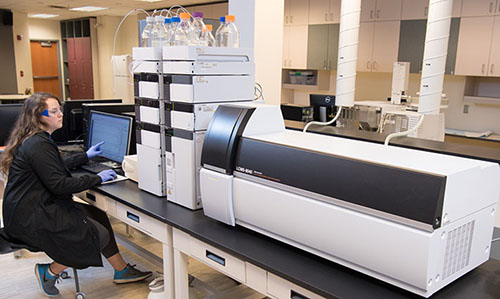 The High-Performance Liquid Chromatograph - Mass Spectrometer in Ferris State University's
Shimadzu Core Laboratory for Academic and Research Excellence will support research
into Anthacyclinone Drug Molecules as part of a three-year, $407,900 grant from the
National Science Foundation. Associate Professor of Medicinal Chemistry Eric Nybo
is a principal investigator in the study.
The High-Performance Liquid Chromatograph - Mass Spectrometer in Ferris State University's
Shimadzu Core Laboratory for Academic and Research Excellence will support research
into Anthacyclinone Drug Molecules as part of a three-year, $407,900 grant from the
National Science Foundation. Associate Professor of Medicinal Chemistry Eric Nybo
is a principal investigator in the study.Several students returning to Ferris State University for the 2020-21 academic year
will have the opportunity to support research funded by the National Science Foundation
while working with professors from the College of Pharmacy and the College of Arts,
Sciences and Education. The project is part of the NSF Facilitating Research at Primarily
Undergraduate Institutions, which funds faculty-driven research that heavily incorporates
undergraduate students. The project is a three-year, $407,900 grant entitled, “NSF
RUI: BIOPOLYMER – BIObricks® POLYketide Metabolic EngineeRing platform.”
Professor Eric Nybo, a principal investigator of the study, is an associate professor
of Medicinal Chemistry in the Pharmaceutical Science program. Nybo said the project
focuses on the genetic engineering of BioBricks® genes, which can encode the blueprints
for biosynthetic pathways that can be expressed in microbial cell factories. The microbial
cell factories that his group uses are actinomycetes, gram-positive, soil-dwelling
bacteria that are known as “nature’s antibiotic factories.” The researchers will engineer
actinomycetes to produce “anthracyclinones,” which are chemical cousins of antibiotics,
anticancer drugs, and various other commodity chemicals.
“A presentation made at the 2019 West Michigan Regional Undergraduate Science Research
Conference last fall was a key component in our success with this grant,” Nybo said.
“The NSF program is intended to facilitate research at schools that are primarily
undergraduate institutions. We are conducting engineering of microbial cell factories,
which will expose the students to research in metabolic engineering, natural products
chemistry, and analytical chemistry practices. We call this production platform by
the acronym, BIOPOLYMER – BIObricks® POLYketide Metabolic EngineeRing platform.”
Professor Schuyler (Sky) Pike, an assistant professor in Biological Sciences and director
of the Shimadzu Core Laboratory for Academic and Research Excellence, is a study co-principal
investigator, with Nybo. Pike said they plan to select four students from the undergraduate
ranks in science, technology, engineering or mathematics to be involved in this project.
“Students from Ferris’ Biotechnology, Biology and Chemistry programs are likely to
present the most qualified candidates,” Pike said. “These students must be capable
of comprehending the chemistry and biology of our compounds, which will provide them
an incredible experience while they work to support their educational costs. Some
of their laboratory efforts will involve working with our Nuclear Magnetic Resonance
(NMR) Spectrometer, and the High-Performance Liquid Chromatography-Mass Spectrometer
(HPLC-MS). The ability to access and operate such equipment is a unique prospect,
a graduate school-level opportunity that should present a great boost to their career
prospects.”
Nybo said their student workers are also responsible for producing a bi-weekly podcast
on various STEM topics.
“They will choose their topics, but some of the prospective subject areas could include
genetic engineering and attitudes toward genetically modified organisms,” Nybo said.
“It should be another excellent learning activity for these students, and a valuable
addition to their educational experience, and resumes.”
Nybo added that Mikko Metsä-Ketelä, an associate professor of Biochemistry with the
University of Turku in Finland, is a collaborator in this research effort, which saw
its formative funding offered in an ADVANCE grant from the Michigan Economic Development Corporation.

